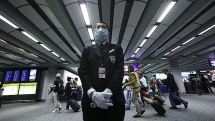First death from China’s Wuhan pneumonia outbreak
 |
| The infection was first confirmed on December 31 in Wuhan, a central Chinese city with a population of over 11 million. Photo: AFP/STR |
Forty-one people with pneumonia-like symptoms have so far been diagnosed with the new virus in the central Chinese city of Wuhan, with one of the victims dying on Thursday, Wuhan's health commission said on its website.
Seven others remained in serious condition, two were discharged from treatment, and the rest were stable, it added.
The Wuhan health commission said the man who died had purchased goods from a seafood market in the city identified by authorities as the centre of the outbreak. It was closed on Jan 1.
The man, who also had underlying health issues including chronic liver disease, died in hospital on Thursday of "respiratory failure and severe pneumonia", the commission said.
No new cases have been detected since Jan 3 nor any "clear evidence of human-to-human transmission", it added.
The episode has caused alarm due to the spectre of SARS, which in 2002-2003 killed 349 people in mainland China and another 299 in Hong Kong.
Chinese scientists investigating the outbreak said last week they believe the pathogen to be a previously unknown type of coronavirus, a broad family ranging from the common cold to more serious illnesses like SARS.
Scientists in Hong Kong's Department of Health said Saturday that genetic sequencing of the virus found in one of the Wuhan patients and published online by a Chinese expert indicated it was 80 percent similar to SARS found in bats.
Hong Kong authorities said on Saturday that the number of people who have been hospitalised with flu-like symptoms in recent days after travelling to Wuhan had grown to 60, including seven new cases since Friday.
Forty-six of that total, however, have already been discharged. None have yet been diagnosed with the new coronavirus.
China has entered its annual Lunar New Year holiday travel rush, raising the spectre of the mass movement of people serving as a vector for the pathogen. But the country has not announced any travel restrictions.
However, WHO said Thursday it was not recommending any specific measures for travellers or restrictions on trade with China, and expressed confidence in the ability of Chinese authorities to contain the virus.
According to WHO, the virus, which infected more than 8,000 people around the world, is believed to have originated in the southern Chinese province of Guangdong.
WHO announced that China was free of SARS in May 2004./.
Recommended
 World
World
G7 Summit marks turning point in India-Canada relations, says former minister Ujjal Dosanjh
 World
World
India reports 9 Pakistani Aircraft Destroyed In Operation Sindoor Strikes
 World
World
Thailand Positions Itself As a Global Wellness Destination
 World
World
Indonesia Accelerates Procedures to Join OECD
Popular article
 World
World
South Korea elects Lee Jae-myung president
 World
World
22nd Shangri-La Dialogue: Japan, Philippines boost defence cooperation
 World
World
Pakistan NCRC report explores emerging child rights issues
 World
World










